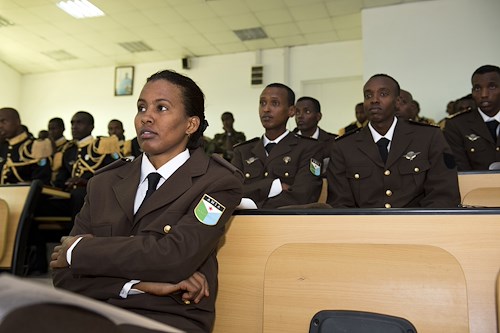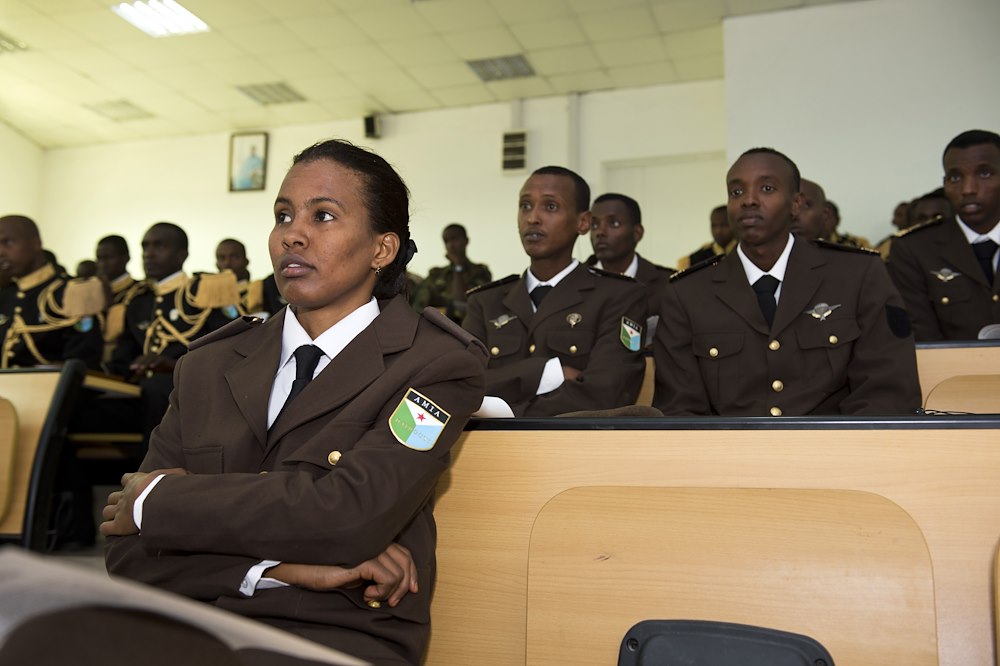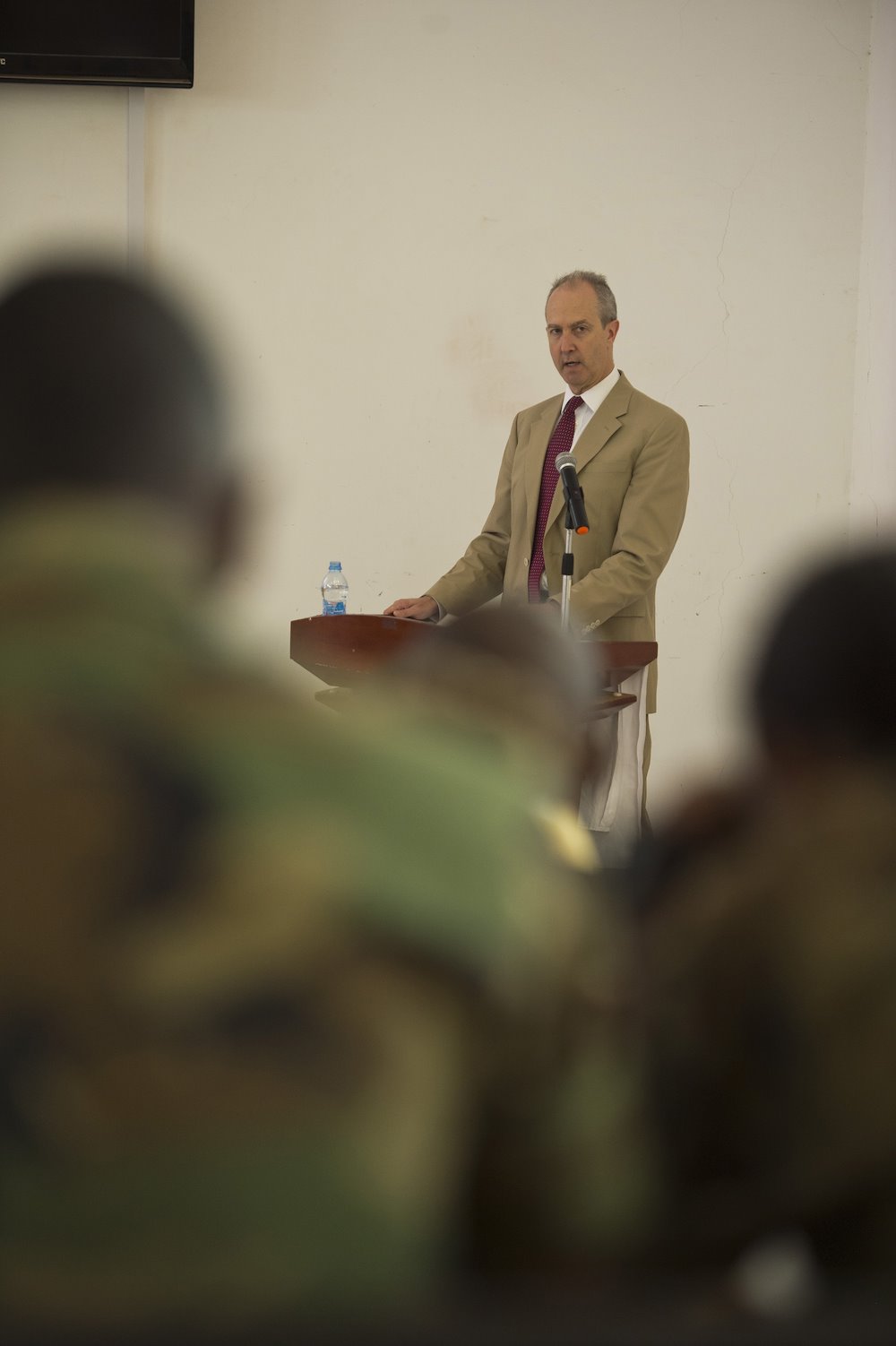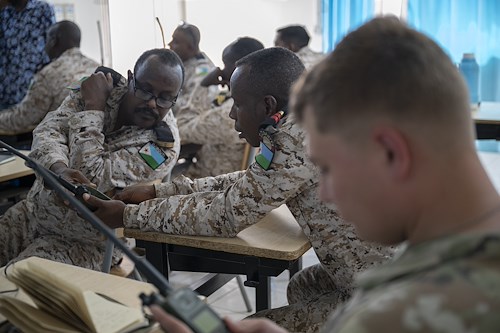Gallery contains 5 images
×
Photo 1 of 5
U.S., Djiboutian military holds conference on civil military operations
Djiboutian military and law enforcement cadets attend briefings at the first Geo-Strategy Meeting held at the Joint Military Academy of Arta, Arta, Djibouti, April 20, 2015. The meeting’s focus was on the effects military and police actions can have on civilian populations, and the need to mitigate these affects through planning and preparation. (U.S. Air Force photo by Staff Sgt. Nathan Maysonet)
Photo by: Staff Sgt. Nathan Maysonet
Photo 2 of 5
Combined Joint Task Force - Horn of Africa Image
Tom Kelly, U.S. Ambassador to Djibouti, speaks to cadets at the first ever Geo-Strategy Meeting at the Joint Military Academy of Arta, Arta, Djibouti, April 20, 2015. Kelly was one of three guest speakers at the event discussing the importance of military and law enforcement leaders to plan for the protection of civilians and their livelihoods when performing military actions. (U.S. Air Force photo by Staff Sgt. Nathan Maysonet)
Photo by: Staff Sgt. Nathan Maysonet
Photo 3 of 5
Combined Joint Task Force - Horn of Africa Image
The Joint Military Academy of Arta hosted the first ever Geo-Strategy Meeting entitled “Civilians on the Battlefield,” in Arta, Djibouti, April 20, 2015. The conference was a joint effort by the Djiboutian Armed Forces, U.S. Army’s 404th Civil Affairs Battalion, the American ambassador to Djibouti and the U.N. High Commissioner for Refugees. (U.S. Air Force photo by Staff Sgt. Nathan Maysonet)
Photo by: Staff Sgt. Nathan Maysonet
Photo 4 of 5
Combined Joint Task Force - Horn of Africa Image
Lt. Col. Timothy Brennan, 404th Civil Affairs Battalion commander, Speaks at the first Geo-Strategy Meeting held at the Joint Military Academy of Arta, Arta, Djibouti, April 20, 2015. Brennan spoke to the cadets about the importance of planning, preparing and protecting civilians caught in the middle of military and law enforcements actions. (U.S. Air Force photo by Staff Sgt. Nathan Maysonet)
Photo by: Staff Sgt. Nathan Maysonet
Photo 5 of 5
Combined Joint Task Force - Horn of Africa Image
Albert Katumba, U.N. High Commissioner for Refugees representative, speaks at the first ever Geo-Strategy Meeting at the Joint Military Academy of Arta, Arta, Djibouti, April 20, 2015. Katumba spoke to the cadets about the effects war can have on civilian populations specifically the displacement of civilians. (U.S. Air Force photo by Staff Sgt. Nathan Maysonet)
Photo by: Staff Sgt. Nathan Maysonet
According to the U.N. High Commissioner of Refugees, tens of thousands of people are expected to flee to the Horn of Africa due to the continuing conflicts in the Middle East.
As refugees flee from conflict zones around the world, it has become increasingly apparent that the impact police and military actions can have on the lives of those caught in the middle must be planned for and addressed by leaders.
With a topic inspired by current events, the U.S. Army’s 404th Civil Affairs Battalion (Airborne) and the Djibouti armed forces have partnered together to host the first Geo-Strategy Conference at the Joint Military Academy of Arta (AMIA) entitled, “Civilians on the Battlefield: The Consequences of Armed Conflict on Civilians in East Africa from 1990-2015,” April 20, 2015. The purpose of the discussions was to foster further development of the Djiboutian AMIA cadets by discussing civil and military planning considerations at the operational and strategic levels.
“We want to work with the cadets there to help them understand that in war you must consider the civilians and how it affects them,” said 1st Lt. Sean Rios, 404th CA BN Alpha Company team chief and one of the conference’s planners. “As future leaders, they have to understand and plan for that.”
Speakers at the conference included the U.S. ambassador to Djibouti and a U.N. representative for the U.N. High Commissioner for Refugees, and Lt. Col. Timothy Brennan, 404th CA BN commander.
“We put this conference on for the cadets here at the AMIA academy, which is the Djiboutian equivalent of our West Point,” said Brennan. “This was specifically about the protection of civilians on the battle field and how we as military leaders need to number one: ensure we adhere to that, and number two: ensure that our soldiers know there are specific rules of engagement that we must follow.”
To bring these two points into perspective, Brennan shared with the cadets his own experience seeing the effects of war on civilians.
“As a young 2nd lieutenant in Bosnia I was tasked with protecting a mass grave that we found,” Brennan said. “That memory is one of the reasons I went into civil affairs after the infantry, and reminds me of why we as military must always strive to better protect civilians.”
In addition to the military concerns, both the U.S. ambassador and U.N. representative spoke about the human cost of displaced civilians including health and welfare concerns.
Current events make the timing and location of this conference at AMIA and the chosen topic by the guest speakers an obvious one.
“I think it’s vitally important not just for Northeast Africa or the military, but for Djibouti,” said Brennan. Djibouti is a beacon of stability in Northeast Africa. Everything they are doing, from helping the refugees from Somalia as well as the evacuees coming out of Yemen, Djibouti has been phenomenal. This new breed of military personnel from the academy are the future leaders of Djibouti, so helping them with different ideas and military procedures will only increase their military capacity and help bring stability to Northeast Africa.”
With the conference’s success, plans are already in the works for future events with the ultimate goal of making the Geo-Strategy Conference a quarterly event.
Making this and future conferences possible is the teamwork found in East Africa.
“This is a team effort,” Brennan said. “In addition to the U.S., we have French and Moroccan military leaders here. This is Djibouti and its partner nations all coming together.”




















